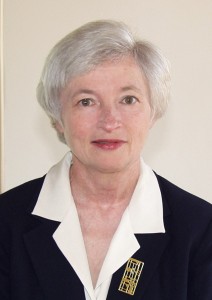
With former Treasury Secretary Larry Summers pulling out of the running to lead the Federal Reserve, the White House now says that Janet Yellen is the frontrunner.
Yellen has close ties to the Bay Area. She was the head of the Federal Reserve Bank of San Francisco and a faculty member of the Haas School of Business at UC Berkeley, where she remains a professor emerita of economics. She also has a home here.
Not everyone's on board with a Yellen appointment. She's often referred to as a "monetary dove," more concerned with unemployment than inflation. From the New York Times in April:
Ms. Yellen’s critics remain wary. They worry that she would not be sufficiently concerned about the possibility that inflation will accelerate as the economic recovery gains strength. If nominated, she could face opposition from Senate Republicans who have repeatedly expressed concern that the Fed’s campaign would destabilize financial markets and make controlling the pace of inflation more difficult.
“I think people read Janet Yellen’s speeches as saying that she puts a higher weight on joblessness compared to inflation” than the typical member of the Fed’s policy-making committee, said Vincent Reinhart, formerly the head of the Fed’s monetary policy staff and now the chief United States economist at Morgan Stanley. “And that includes Ben Bernanke.”
The question of her candidacy has also become embroiled with gender politics, as she would be the first woman to lead the Federal Reserve. The Wall Street Journal editorialized in July: "As an economist with long experience at the Fed, she doesn't lack for professional credentials. But her cause has been taken up by the liberal diversity police as a gender issue because she'd be the first female Fed chairman." In response, New York Magazine's Jonathan Chait wrote that the criticism "[put] a fine point on the gender panic that is now infusing the hard-money cranks."
One person who has spoken well of Yellen is former Fed chief Alan Greenspan. Again from the Times:
Mr. Greenspan said that he continued to hold Ms. Yellen in high regard. “I did listen to her more carefully because she articulates her position in a way that you can follow it analytically,” he said in an interview. “Intuitions are useless. Janet’s conversation and her presentations were factually based, and that always got my attention.”
Andrew Rose is an associate dean and chair of the faculty of UC Berkeley's Haas School of Business. Rose has cowritten a number of papers with Yellen and also taught with her. He's a strong supporter of her candidacy, and earlier this week KQED's Mina Kim spoke with him to get a sense of her working style.